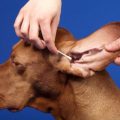Parasites in animals – how to protect yourself and your pet?
helminthiasis, ie. diseases caused by parasites, meet the animals often enough. Diagnostics, treatment and prevention of diseases among the essential duties of a pet owner, tk. parasites not only cause suffering to animals, but also can be transmitted to humans.
Even with careful care and care for the animals likely helminth infection home (not to mention the street) animals is very high.
The problem is, that the naked eye the presence of parasites in an animal is not immediately possible to detect. And pet owners believe, that they are well cared for their pets, and they can not be parasites.
but, studies say, that more than half of the animals, living next to a man, affected by the presence of parasites. Some of the species of parasites, that infect animals, They represent a mortal threat not only to pets, but also for their owners.
ugly symptoms
Of course, pets infected with parasites and sick pets themselves cannot tell their owners about their condition. Therefore, animal owners should rely only on their own observations., to tell your veterinarian about them, who will take measures to save the animal.
If there are changes in the behavior of the animal, the pet becomes less active, he gets sleepy, he constantly moans or howls, the owner should be wary.
symptoms, which should alert:
- Pets stop playing, show indifference to food. Constantly thirsty.
- The animal's nose becomes dry and hot.
- The mucous membrane of the eye becomes irritated, tears flow from my eyes.
- The animal's stool is not regular.
Most often, the first sign of infection with worms is a lack of appetite.. It means, that there are a lot of parasites in the body, and if left untreated, intestinal blockage may occur, as a result of which the animal may die.
Therefore, if you find dangerous symptoms, you should immediately contact your veterinarian., to save the animal and protect yourself and loved ones from infection.
There is a delusion, what do pets have, not going outside, there can be no parasites. This is not so - even the most well-groomed animal can have intestinal parasites.. People themselves bring flea or worm eggs into the house on their shoes along with street dirt, flies that have flown into the house can lay the larvae of worms in the food of pets, etc..
How can you get infected from animals:
- fleas. Fleas in animals is considered commonplace., and the owners often do not see this as a danger. but, experts say, what if the pet has fleas, intestinal parasites are most likely to be found in it.
- helminths (worms) and roundworms. Pets are very common carriers of helminths.. They become infected with helminths on the street - in contact with the feces of an infected animal, at home - eating contaminated food. Person, hugging your pet, can easily become infected with helminths.
- Echinococci. Dogs often carry and spread these parasites., which can infect a person. If echinococcosis is not treated, death occurs.
- Toxoplasma. Toxoplasmosis is more common in cat owners, who are carriers and carriers of Toxoplasma. Toxoplasmosis is especially dangerous for pregnant women..
Infection with parasites invariably leads to irreversible consequences in the body of the animal., and sometimes even leads to the death of a pet.
Precautionary measures
The best prevention against infection with parasitic invasions is to protect yourself from contact with animals. But for pet owners, such a condition is impracticable., because they are too attached to their favorites.
Easier to follow simple rules for keeping animals:
- Deworm pets at least twice a year. Simultaneously, as a preventive measure, it is worth drinking antihistamines for all family members.
- Prevent the appearance of external parasites in animals- regularly treat pets with special shampoos and products, which veterinarian can advise.
- For the slightest change in the behavior of the animal, contact your veterinarian, get tested for worms.
- Observe hygiene and cleanliness in the premises.
- Do not feed animals with raw fish or meat, which may contain parasites.
- Do not kiss or press pets to your face.
Currently, there are a lot of drugs, with which you can "glide" the pet. Your veterinarian will help you find the right product., based on the symptoms of the disease. Anthelmintics should be given to animals., without waiting for that moment, when pets are completely emaciated, and parasite larvae will appear in their excrement.
Timely prevention and treatment of parasitic diseases in animals will prevent health problems not only in pets, but also their owners.














